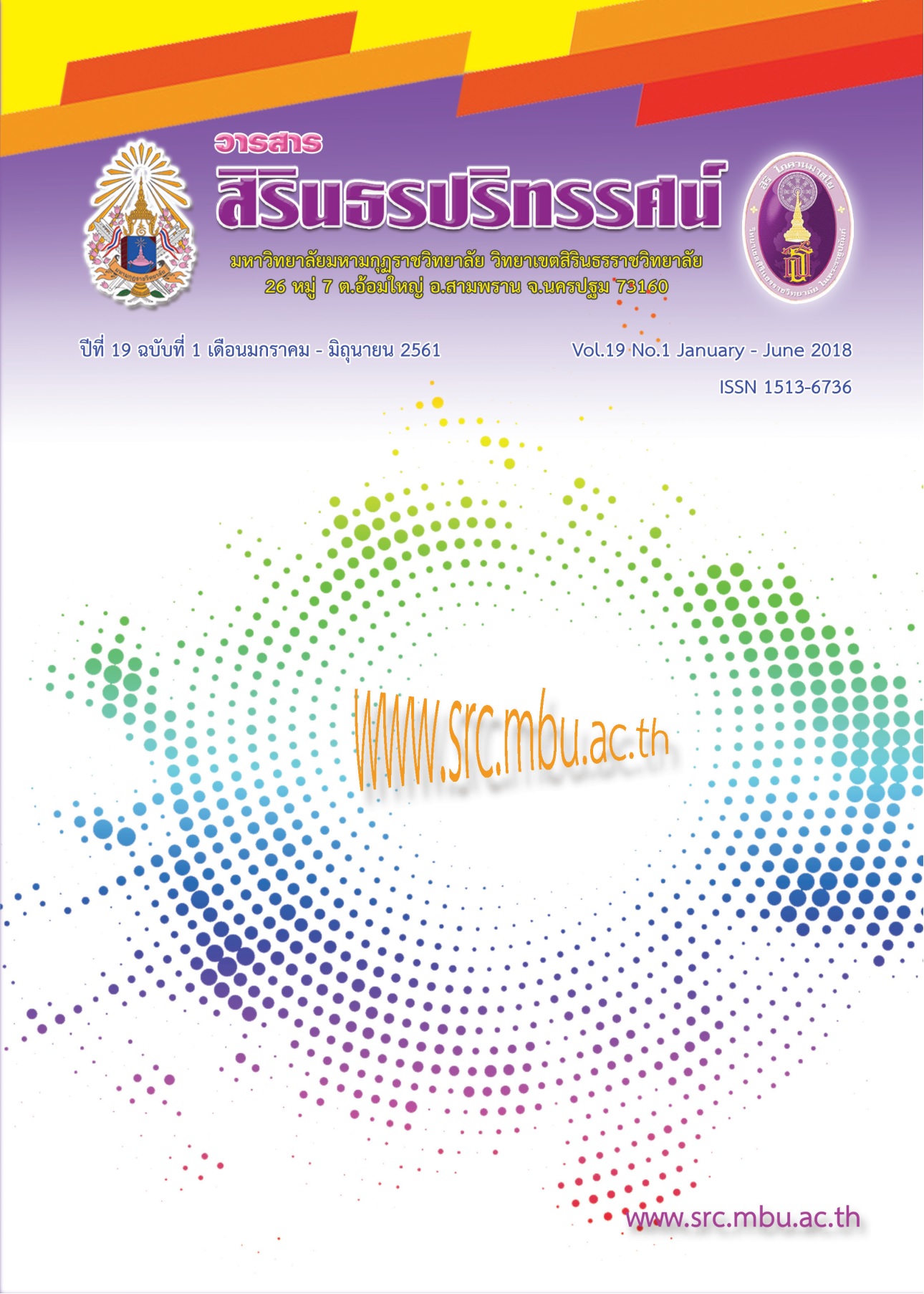Academic Administration Guidelines for Wangcholasin School District under Ayutthaya Primary Educational Service Area Office 1
Keywords:
Academic administration, primary schoolAbstract
The purposes of this study were to 1) investigate the levels problems of academic administration. and 2) examine the guidelines for solving its problems of academic administration problems for Wangcholasin School District under Ayutthaya Primary Educational Service Area Office 1. The population used in this study were teachers in Wangcholasin School of 138 teachers from 103 sampling groups using By opening the table, Krejcie and Morgan. The research instrument was a questionnaire and interview with the reliability of .97. The data were statistically analyzed by using frequency, percentage, standard deviation.
The findings revealed that
- The levels of academic administration problems for Wangcholasin School District under Ayutthaya Primary Educational Service Area Office Were
rated at a moderate level in all aspects (x = 3.38). Ranked in descending order
by mean of each aspect relevant to the academic administration problems, the
results demonstrated as follows: The curriculum and curriculum administration were
the highest (x = 3.69), Secondary the learning development research (x = 3.47) teaching and learning management (x = 3.44), educational quality assurance (x = 3.35), educational measurement and evaluation (x = 3.18) and school supervision (x = 3.16) respectively.
- Academic administration guidelines, issues for an Interview were on the
three most problematic aspects with the top three mean scores, the findings exhibited as follows: (1) Regarding curriculum and curriculum administration, The organization should organize training courses that have common guidelines and understanding. Comply with the standard of learning management. To achieve the quality standard of the curriculum and to effectively use the teaching and learning.
(2) Research and development administration. The teacher should have training in research. The meeting was held to jointly set out issues related to academic problems or academic development issues. To develop learning by
learning problems. Plan to solve learning problems. Data Collection And syst analysis. Teachers can do research and develop educational innovations that lead to quality learning, (3) The teaching and learning. The agency should organize training and development of teaching materials for teachers. The budget is sufficient to meet the needs of the teaching media and the teaching and learning activities so that the instructor can arrange the atmosphere, learning media environment and facilitate the learners to learn.
References
2.กรมสามัญศึกษา. (2544). การประกันคุณภาพการศึกษา. กรุงเทพฯ : ส านักทดสอบทางการศึกษา. กรมวิชาการ. (2543). การพัฒนาหลักสูตรการศึกษาขั้นพื้นฐาน. กรุงเทพ ฯ : โรงพิมพ์กรมการศาสนา.
3.กระทรวงศึกษาธิการ. (2546). คู่มือการบริหารสถานศึกษาขั้นพื้นฐานที่เป็นนิติบุคคล. กรุงเทพฯ : โรงพิมพ์องค์การรับส่งสินค้าและพัสดุภัณฑ์.(ร.ส.พ).
4.. (2551). หลักสูตรแกนกลาง การศึกษาขั้นพื้นฐาน พุทธศักราช 2551. กรุงเทพฯ : ชุมนุมสหกรณ์การเกษตรแห่งประเทศไทย.
5.กลุ่มโรงเรียนวังชลสินธุ์. (2559). รายงานการประเมินตนเอง (SAR) กลุ่มโรงเรียนวังชลสินธุ์ สังกัด ส านักงานเขตพื้นที่การศึกษาประถมศึกษาพระนครศรีอยุธยา เขต 1 ปีการศึกษา 2559. พระนครศรีอยุธยา : สำเนา
6.กษิรา วาระรัมย์. (2556). การศึกษาปัญหา และข้อเสนอแนะการบริหารงานวิชาการของโรงเรียน ในสังกัดกรุงเทพมหานคร ที่ใช้หลักสูตรแกนกลางการศึกษาขั้นพื้นฐาน พุทธศักราช2551 . สารนิพนธ์ การศึกษามหาบัณฑิต สาขาการบริหารการศึกษา มหาวิทยาลัย ศรีนครินทรวิโรฒ.
7.กิติมา ปรีดีดิลก. (2532). การบริหารและการนิเทศการศึกษาเบื้องต้น. กรุงเทพฯ : อักษรพิพัฒน์.
8.ครุรักษ์ ภิรมย์รักษ์. (2543). เรียนรู้และฝึกปฏิบัติการวิจัยในชั้นเรียน. ชลบุรี : งามช่าง.
9.โครงการ PISA สถาบันส่งเสริมการสอนวิทยาศาสตร์และเทคโนโลยี. (2554). ตัวอย่างประเมิน ประเมินผลนานาชาติ PISA: คณิตศาสตร์. (พิมพ์ครั้งที่ 2). กรุงเทพฯ : สสวท.
10.จักราวุธ คาทวี. (2557). สันติ/สามัคคี/ปรองดอง/ค่านิยม 12 ประการ ของ คสช. : เนื้อหาช่วย สอนและจัดกิจกรรมเพื่อนครู. [ออนไลน์]. เข้าถึงได้จาก : http : //Jukravuth. blogspot. Com. วันที่สืบค้น 2560, สิงหาคม 30.
11.จีณัญญาพัจน์ โคตรหลักคำ. (2559). แนวทางการบริหารงานวิชาการของโรงเรียนมัธยมศึกษาสังกัดสำนักงานเขตพื้นที่การศึกษามัธยมศึกษา เขต 19. สารนิพนธ์ สาขาการบริหารการศึกษาคณะศึกษาศาสตร์ มหาวิทยาลัยมหาสารคาม.
12.โรงเรียนวัดวงษ์สวรรค์. (2559). รายงานการประเมินตนเอง (SAR) โรงเรียนวัดวงษ์สวรรค์ ประจำปการศึกษา 2559. พระนครศรีอยุธยา : โรงเรียนวัดวงษ์สวรรค์.
13.โรงเรียนสุวพรรณสนิทวงศ์พิทยา. (2559). รายงานการประเมินตนเอง (SAR) โรงเรียนสุวพรรณ สนิทวงศ์พิทยา ประจำปการศึกษา 2559. พระนครศรีอยุธยา : โรงเรียนสุวพรรณสนิทวงศ์ พิทยา.
14.โรงเรียนบ้านลำแดง. (2559). รายงานการประเมินตนเอง (SAR) โรงเรียนบ้านลำแดง ประจำปีการศึกษา 2559. พระนครศรีอยุธยา : โรงเรียนบ้านลำแดง.
15.โรงเรียนวัดลำพระยา (แช่มช้อยวิทยา). (2559). รายงานการประเมินตนเอง (SAR) โรงเรียนวัดลำพระยา (แช่มช้อยวิทยา ) ประจำปีการศึกษา 2559. พระนครศรีอยุธยา : โรงเรียนวัดลำพระยา (แช่มช้อยวิทยา).
16.โรงเรียนคอตันคลอง 27. (2559). รายงานการประเมินตนเอง (SAR) โรงเรียนคอตันคลอง 27ประจำปีการศึกษา 2559. พระนครศรีอยุธยา : โรงเรียนคอตันคลอง 27. โรงเรียนวัด
17.ธรรมจริยา. (2559). รายงานการประเมินตนเอง (SAR) โรงเรียนวัดธรรมจริยาประจำปีการศึกษา 2559. พระนครศรีอยุธยา : โรงเรียนวัดธรรมจริยา. โรงเรียนวัดสว่าง
18.อารมณ์. (2559). รายงานการประเมินตนเอง (SAR) โรงเรียนวัดสว่างอารมณ์ประจำปีการศึกษา 2559. พระนครศรีอยุธยา : โรงเรียนวัดสว่างอารมณ์. โรงเรียนกลาง
19.คลอง 27. (2559). รายงานการประเมินตนเอง (SAR) โรงเรียนกลางคลอง 27ประจำปีการศึกษา 2559. พระนครศรีอยุธยา : โรงเรียนกลางคลอง 27. โรงเรียนวัดยมนา
20.ตามธรรม. (2559). รายงานการประเมินตนเอง (SAR) โรงเรียนวัดยมนาตามธรรมประจำปีการศึกษา 2559. พระนครศรีอยุธยา : โรงเรียนวัดยมนาตามธรรม
21.Arthe, R. R. (1980). The elementary principals perceptions of their own and theteacher roles incurriculumdecisionmaking.Dissertation Abstracts International, 40(6), 3076
22.Bigos, C. J. (1997). An identification of principal instructional leadership behavior in effective high school. Dissertation Abstracts International, 44(5), 1509- 1514.
23.Brophy, G. M. (2006). A study of the process used by academic affairs administrators at participating institutions of higher education to select instructional technology tools faculty use in instruction in undergraduate classes. Dissertation Abstract International, 24(2), 171-A.
Downloads
Published
Issue
Section
License
บทความที่ได้รับการตีพิมพ์เป็นลิขสิทธิ์ของ มหาวิทยาลัยมหามกุฏราชวิทยาลัย วิทยาเขตสิรินธรราชวิทยาลัย
ข้อความที่ปรากฏในบทความแต่ละเรื่องในวารสารวิชาการเล่มนี้เป็นความคิดเห็นส่วนตัวของผู้เขียนแต่ละท่านไม่เกี่ยวข้องกับหาวิทยาลัยมหามกุฏราชวิทยาลัย วิทยาเขตสิรินธรราชวิทยาลัย และคณาจารย์ท่านอื่นๆในมหาวิทยาลัยฯ แต่อย่างใด ความรับผิดชอบองค์ประกอบทั้งหมดของบทความแต่ละเรื่องเป็นของผู้เขียนแต่ละท่าน หากมีความผิดพลาดใดๆ ผู้เขียนแต่ละท่านจะรับผิดชอบบทความของตนเองแต่ผู้เดียว




